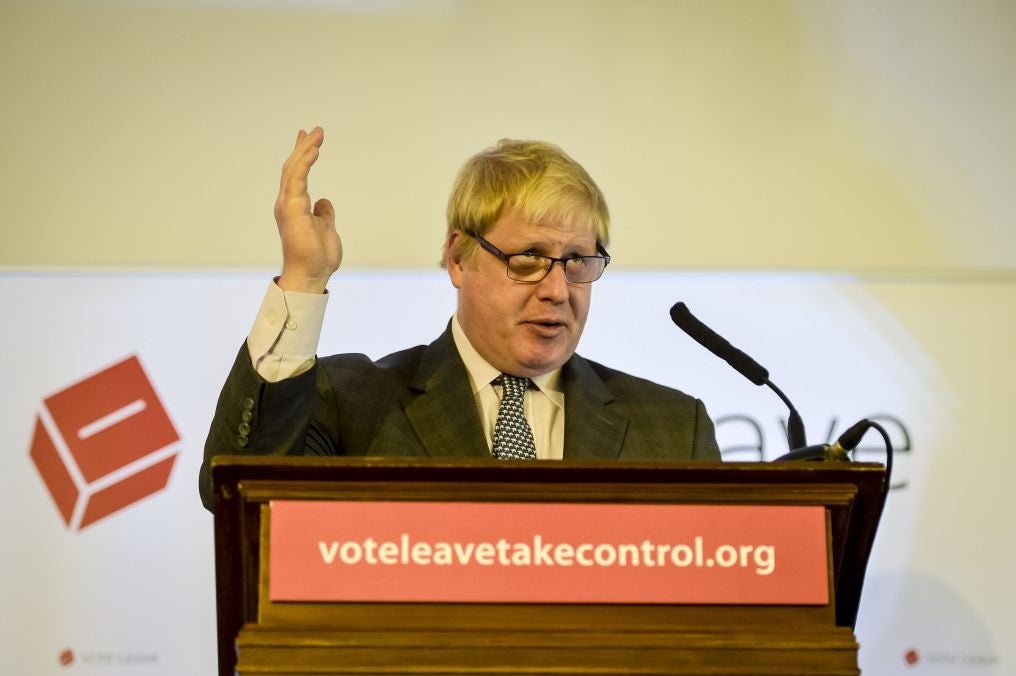EU referendum: Boris Johnson is trusted by twice as many voters as David Cameron to tell truth about Europe
Exclusive: ComRes poll for The Independent finds that Leave is winning on national security and controlling borders but not on making people better off

Your support helps us to tell the story
From reproductive rights to climate change to Big Tech, The Independent is on the ground when the story is developing. Whether it's investigating the financials of Elon Musk's pro-Trump PAC or producing our latest documentary, 'The A Word', which shines a light on the American women fighting for reproductive rights, we know how important it is to parse out the facts from the messaging.
At such a critical moment in US history, we need reporters on the ground. Your donation allows us to keep sending journalists to speak to both sides of the story.
The Independent is trusted by Americans across the entire political spectrum. And unlike many other quality news outlets, we choose not to lock Americans out of our reporting and analysis with paywalls. We believe quality journalism should be available to everyone, paid for by those who can afford it.
Your support makes all the difference.Boris Johnson is trusted to tell the truth about Europe by twice as many voters as trust David Cameron, according to a ComRes poll for The Independent. By a two-to-one margin, 45 per cent to 21 per cent, voters say that Mr Johnson is “more likely to tell the truth about the EU” than Mr Cameron.
By a smaller margin, 39 per cent to 24 per cent, campaigners for Leave generally are considered “more likely to tell the truth” than campaigners for Remain.
The shock finding will dismay the Prime Minister after a week in which he warned of possible “conflict” in Europe as a result of Brexit, and the Bank and England and IMF warned of the danger of recession.
Despite Mr Cameron’s warning, more voters say Britain’s national security would be stronger if Britain left the EU, 42 per cent, than if it stayed, 38 per cent. This is a reversal of views since March, when by 42 per cent to 35 per cent voters said that national security would be stronger by staying in the EU.
The poll also finds that by a large majority, 57 per cent to 27 per cent, people believe that “the British government could control Britain’s borders better if it left the EU” than by staying.
On the crucial question of prosperity, though, more voters say they would be “personally better off” if Britain remained in the EU, 33 per cent, than if it left, 29 per cent. This four-point advantage for the Remain side on the economy has increased slightly from a two-point lead in February.
The other findings, however, will disappoint No 10 after a week in which the Remain case was bolstered by the intervention of Mark Carney, the Governor of the Bank of England, on Thursday, as the poll was being carried out.
The poll finds that Mr Johnson enjoys a large credibility advantage over Mr Cameron even among Conservative voters, by 42 to 27 per cent, although a significant minority, 30 per cent, say they don’t know.
This will alarm the Prime Minister after a series of public appearances by Mr Johnson that attracted poor notices from the critics. The former Mayor of London was considered to have performed badly in an interview on the Andrew Marr Show and a hearing of the Treasury select committee in March. On Wednesday this week he was considered by many commentators to have been evasive on the BBC Radio 4 Today programme, refusing to say whether he had written two columns for decision on Brexit, one in favour and one against, before plumping for Leave.
Nicholas Soames, the Conservative MP and grandson of Winston Churchill, last night accused Mr Johnson of “fundamentally dishonest gymnastics” for criticising the Transatlantic Trade and Investment Partnership, the planned free trade deal between the EU and the US which he previously praised as “Churchillian” for its brilliance. In an interview with The Observer, Mr Soames said Mr Johnson’s apparent change of mind showed a “complete lack of credibility and coherence”.
Mr Johnson’s reputation for telling the truth may also be surprising, given that he was sacked by The Times early in his career for making up a quotation, and was also sacked from the Conservative front bench by Michael Howard in 2004 for misleading him about an extra-marital affair.
The Leave campaign was considered by No 10 to have had a bad week, issuing a late-night statement on Wednesday condemning ITV and its political editor, Robert Peston, for having joined the “In” campaign for arranging a head-to-head programme featuring Mr Cameron and Nigel Farage, the Ukip leader who is not involved with the official Leave campaign.
A No 10 source told The Independent that the “Stronger In” campaign’s polling, carried out by Lord Cooper, the former Conservative pollster, suggested that the fundamentals of public opinion favour a vote for EU membership. Drawing a distinction between the headline numbers and the “equities” of opinion polls, the source said: “On risk and the economy, public opinion is moving heavily in our direction.”
Our Independent/ComRes poll also tested voters’ knowledge about the EU and found that 73 per cent didn’t know how many countries are EU members and 61 per cent wrongly thought the European Parliament has to approve “most” British laws. However, large majorities said, correctly, that the UK pays more into the EU budget than it gets back, and 60 per cent knew that the Treasury had estimated that leaving the EU would cost the average household £4,300 a year by 2030.
ComRes interviewed 2,043 GB adults online on 11 and 12 May 2016. Full tables on the ComRes website.
Join our commenting forum
Join thought-provoking conversations, follow other Independent readers and see their replies
Comments